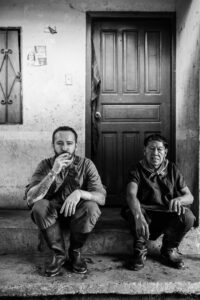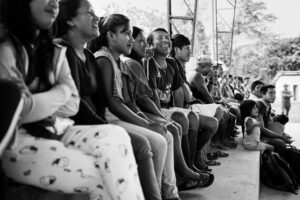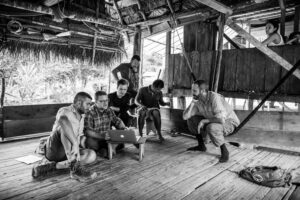Engaged Anthropology Grant: Michael Cepek

Michael Cepek is an Associate Professor at the University of Texas as San Antonio. In 2012 he received a Post-Ph.D. Research Grant to aid research on “Dureno Uno: A Cofán Politics of Oil and Loss”. In 2017 Dr. Cepek received an Engaged Anthropology Grant to aid engaged activities on “Developing a Cofan Protocol for the Conduct of Ethical Research”.
In May of 2012, I began a three-year period of Wenner-Gren-funded research on the relationship between the indigenous Cofán nation of eastern Ecuador and the transnational petroleum industry. In 1964, the corporation Texaco began searching for oil in Cofán territory. Three years later, the company discovered a petroleum field underneath a Cofán village. By the mid-1970s, Ecuador had become an OPEC nation, and Cofán people’s lives had changed dramatically: roads and pipelines had cut through their homeland, tens of thousands of settlers had expropriated their territory, and oil-related toxins had suffused their air, forests, rivers, and bodies.
The data I gathered through participant observation, semi-structured interviews, and economic diaries supplied the ethnographic material for Life in Oil: Cofán Survival in the Petroleum Fields of Amazonia, a book that will be published by the University of Texas Press in early 2018. For decades, Cofán lives and lands have served the global media as potent symbols of oil’s destructive powers. By conceptualizing oil as a simultaneously material, social, and discursive phenomenon, Life in Oil complicates existing accounts of crude’s devastation of the Cofán nation. The book describes Cofán life in the midst of the petroleum industry as a form of slow, contradictory, and ultimately unknowable violence. By attending to the open-ended quality of Cofán experiences with oil, the book treads the line between affirming the continuity of a meaningful way of life and describing how that way of life has been impacted by the petroleum industry, which, I argue, should compensate Cofán people for the losses they have suffered.

While conducting research, it became clear that it was impossible to understand Cofán stances toward oil without investigating their perspectives on the dozens of journalists, anthropologists, filmmakers, lawyers, and activists who have come to their communities and produced representations of their petroleum-damaged lives. My Cofán collaborators expressed deep uncertainty and antagonism toward non-Cofán reporters and scholars. They told me that outsiders often portray them in problematic ways, do not compensate them for their collaboration, do not get informed consent for their work, and offer no real benefits to Cofán individuals or communities. Despite my more than two decades of involvement with the Cofán nation as a scholar and an activist, I learned that much of my fieldwork on oil was interpreted in the same way.
With the support of a Wenner-Gren Engaged Anthropology Grant, I returned to Cofán territory in 2017 to share the results of my fieldwork and to gather information on Cofán ideas concerning how they can negotiate just, equitable, and transparent partnerships with non-Cofán researchers. To help guide the project, I enrolled Cofán anthropologist Martin Criollo and Cofán university students Hugo and Sadie Lucitante as full-time collaborators. Together, we interviewed past project participants, held community discussions on the possibility of ethical research collaborations, and formulated a written protocol that Cofán individuals, communities, and organizations can use to negotiate agreements with scholars and journalists. We spent more than a month visiting the communities of Dureno, Duvuno, Sinangoé, and Zábalo. We also presented our ideas at a meeting of the Cofán ethnic federation: the Nacionalidad Originario A’i-Kofán del Ecuador (NOAIKE).

Our investigation allowed us to complete a draft research protocol with written versions in English, Spanish, and A’ingae, the Cofán language. The protocol is intended to let non-Cofán researchers know what they must do and how they must do it if they wish to work with Cofán people. It covers many issues: contacting Cofán individuals, communities, and NOAIKE; securing permission to begin research; selecting and paying community members as research subjects and project workers; compensating host communities in material and non-material ways; sharing income from book royalties and other research-related proceeds; establishing credit and authorship in publications and other project products; securing informed consent, privacy, and confidentiality; returning copies of research products to host communities and NOAIKE; and digitally archiving copies of project data so they will be accessible to and controlled by the people and communities from whom they came.
Although our team’s work dealt with a primarily applied topic, it was deeply ethnographic. It depended on developing a subtle understanding of Cofán notions of ownership, fairness, and individual, family, community, and national rights. It also demanded a more nuanced appreciation of the concepts of autonomy and sovereignty that orient Cofán visions of self-determination and political-economic advancement.
The protocol our team composed has yet to be approved by the Cofán nation as a whole, which hopefully will meet collectively in early 2018 to discuss our draft, amend it where necessary, and certify it as an official document. Nonetheless, our draft has already served to structure discussions between Cofán people and prospective researchers, including a Colombian artist interested in producing visual representations of Cofán territorial relations and a linguistic team from Brown University and the University of Arizona who intend to document the grammar of A’ingae and to generate A’ingae school materials for Cofán students. Finally, the protocol has helped me to reanalyze my own oil-related data and to envision the politics and practicalities of my next major project, which will examine the relationship between Cofán history and Cofán shamanism. Given the protocol’s demonstrated utility, we hope to make the final version available to other scholars, journalists, and indigenous populations who seek to develop research partnerships within and beyond Amazonia.